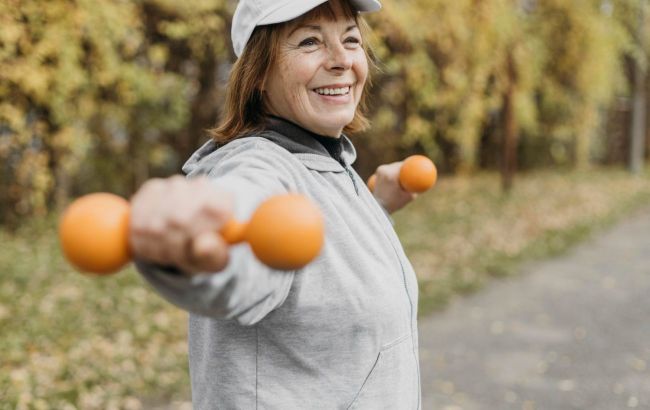Nutritionist outlines 7 rules for women's active longevity
 What to do to stay healthy for longer (photo: Freepik)
What to do to stay healthy for longer (photo: Freepik)
Healthy eating and regular medical check-ups will help maintain good health. However, these are not the only rules to follow to ensure active longevity. Nutritionist Oleg Shvets tells about 7 steps to preserve well-being.
Taking care of women's health
"Many women are accustomed to prioritizing the health and well-being of other family members: parents, siblings, spouses, and children. However, it's difficult to assist those most important to you if you don't make your own health a priority and take careful steps to maintain it," emphasizes the doctor.
Regardless of your age or overall health condition, there are 7 important steps that will bring you closer to better health and quality of life:
- quit smoking - besides increasing the risk of cardiovascular diseases and cancer, smoking rapidly accelerates skin aging and overall bodily aging
- undergo recommended medical check-ups annually. This rule will help detect diseases or chronic conditions at early stages and start treatment promptly
- get enough quality sleep - apart from combating signs of aging, regular sleep of eight hours per day promotes mental alertness and helps manage stress levels
- avoid sun exposure from 10:00 a.m. to 2:00 p.m. - when going outside, use sunscreen with SPF 30 or higher. It's important to protect your skin from sun rays not only in summer
- visit your doctor every year. Even if you feel well, regular visits to a specialist increase the chances of early detection of health problems
- physical activity should be a part of your life. Even if you only have 20 minutes a day for exercises, regular sports activities benefit the heart and help maintain weight and stress levels
- healthy eating should be your priority. Avoid overly restrictive diets that limit entire food groups. Choose diverse food options that include plenty of fruits and vegetables.
What your diet should be like
"Regardless of age, women are usually advised to consume a large amount of plant-based foods (vegetables, fruits, berries, grains, legumes, nuts, and seeds) and a moderate amount of animal products (fish, dairy products, eggs, and meat). It's important to limit the consumption of processed foods, especially those high in salt, sugar, and fat, such as confectionery, sausages, and ready-made sauces," advises Shvets.
Women who are planning pregnancy or are already pregnant also need food with folic acid - green leafy vegetables, beans, and citrus fruits to prevent birth defects. It's also important to ensure adequate intake of iodine (150-200 mcg per day) through seafood and iodized salt.
"Women who have reached menopause are recommended to increase their consumption of foods rich in calcium and vitamin D - seafood, fruits, low-fat dairy products, and egg yolks to prevent bone diseases," explains the dietitian.
What physical activity should be like
At least 20-30 minutes of cardiovascular activity per day is recommended - walking, running, swimming, hiking, or cycling. With age, it's beneficial to complement training with weightlifting or other strength exercises to prevent bone density and muscle mass loss.
"The good news about physical exercises is that it's never too late to start. Even if you're over 50 and have no physical fitness, you can still start small and progress to regular workouts that will help improve overall health," says Shvets.
What screenings are necessary
Cholesterol (lipid profile) and blood pressure - women aged 20 and older should have their measurements taken at least once a year. If there are risk factors, the doctor may prescribe these screenings more frequently.
Pelvic exam and Pap smear. Women aged 21 to 65 should undergo these annual screenings at least every three years. It's necessary to consult a gynecologist for these examinations.
Breast exam and mammography. Usually, all women should have breast exams annually starting at age 20. Annual mammography is recommended for women aged 40 to 50 and every two years after age 50. Additionally, monthly breast self-examination is advised.
Osteoporosis screening. Women aged 65 and older are at higher risk of bone problems, so from this age, annual bone density checks are recommended.
Colorectal cancer screening. After age 50, colonoscopy is recommended.
Skin cancer screening. Regardless of age, women should pay attention to moles and changes in the skin. If there's any doubt about a mole that seems unusual, it's necessary to consult a doctor. If there are risk factors for skin cancer, such as a family history, light skin, or sunburn in childhood, consult a doctor about regular screenings.
Diabetes. Depending on family history and risk factors, women aged 40 and older may be prescribed regular screenings. Everyone should be aware of the signs, symptoms of diabetes, and control risk factors.
Read also about what you should eat to be healthy.
This material is for informational purposes only and should not be used for medical diagnosis or self-treatment. Our goal is to provide readers with accurate information about symptoms, causes, and methods of detecting diseases. RBС-Ukraine is not responsible for any diagnoses that readers may make based on materials from the resource. We do not recommend self-treatment and advise consulting a doctor in case of any health concerns.

